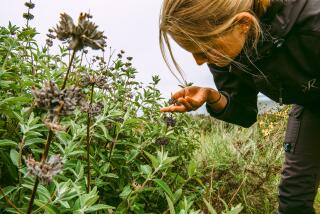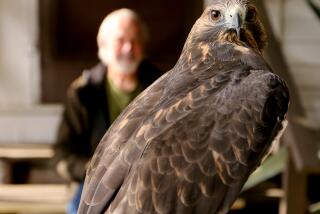Career Takes Exotic Turn for U.S. Wildlife Director : Appointment: Diane Kiyomi Noda heads a team in Ventura trying to save rare species, as well as gauge the impact of proposed development of animals.
- Share via
Diane Kiyomi Noda of Camarillo began college thinking she would save the sick dogs and cats of the world.
Now, Noda, who took over Monday as the director of the Ventura office of the U. S. Fish & Wildlife Service, turns her professional interests to the more exotic--like the endangered species that live within her vast region.
As the new boss, Noda will head a team of 30 scientists, overseeing such high-profile programs as the efforts to save the California condor and the California sea otter. But the office also performs less popular duties, such as evaluating development proposals for potential harm to wildlife.
In the year ahead, Noda hopes to increase community outreach and education about the agency and its role in protecting the world’s disappearing species.
“There is so much bad press about the Endangered Species Act right now,” she said. “But when you’re talking about people’s livelihoods and their jobs, [the act] becomes a very personal thing. They can’t understand why they should give up their jobs for a rat or a mollusk.”
That very rat or mollusk could later become an important source for medicines or provide some other as yet unknown service to mankind or the environment.
“If we keep letting animals or plants disappear for our financial benefit, we won’t know,” she said. “Once it’s gone, it’s gone.”
But Noda, 37, who comes to the service after seven years with the U. S. Army Corps of Engineers, also wants business and industry to know that she solicits input from the community.
“If we’re just butting heads all the time, it’s not an efficient way to operate,” she said. “At the corps, we were often in a neutral roll, with the resource agencies on one side and the applicant [or developer] on the other, and we would try to be the neutral party in the middle.”
*
Carolyn Leavens, a Ventura County businesswoman and farmer who just finished a year as president of the Ventura County Economic Development Assn., welcomed Noda and her perspective.
“We’ve not been the best of friends,” she said about the business and farming industry’s relationship with the Fish & Wildlife office. “We’ve found them pretty hard-nosed and uninterested in talking, and interested only in regulating. We are delighted if they want to have dialogue.”
Noda, who grew up in Los Angeles, began college at Cal Poly Pomona as a pre-veterinarian major. But soon, she said, she realized that she would rather be outdoors than in an office or laboratory.
“I liked seeing how animals interact with their environment, rather than just taking care of sick animals,” she said.
She went on to earn her master’s degree in biology from Cal Poly, completing one year of classes while doing research on a species of ducks in New Zealand.
After a stint with Caltrans in San Diego, the Big Horn Research Institute in Palm Desert and a very brief--10 weeks--tenure as a high school biology teacher, Noda went to work for the Army Corps of Engineers in the Ventura field office.
While the corps is the regulatory branch for enforcing provisions of the Clean Water Act, the U. S. Fish & Wildlife Service biologists act as the research arm for the corps on those matters.
For instance, when the Baldwin Co. was accused of violating a provision of the Clean Water Act that protects wetlands at Ormond Beach in Oxnard, it was the corps that determined whether a violation had occurred.
“Many of us in this office have worked with Diane for years,” said Cat Brown, a veteran biologist with the Fish & Wildlife office in Ventura. “She is very knowledgeable and has an excellent reputation with the resource agencies.”
But her job will not be easy. She will supervise a staff of 30, including botanists, biologists, mammalogists, ornithologists and others. Her field office territory includes parts of Los Angeles County, all of Ventura County and the central coast north to Monterey, as well as parts of Inyo and Mono counties.
*
And the office has myriad duties, including protecting the habitats of endangered species, formulating recovery plans for animals that are nearly extinct such as the California condor, and working to prevent species from becoming so rare that they are endangered.
Noda fills the absence created when Craig Faanes was transferred to the Washington office of the Fish & Wildlife Service last August.
“This office has been without a supervisor for quite a while,” Noda said. “Together, the staff and I will set long-term goals.”
More to Read
Sign up for Essential California
The most important California stories and recommendations in your inbox every morning.
You may occasionally receive promotional content from the Los Angeles Times.










